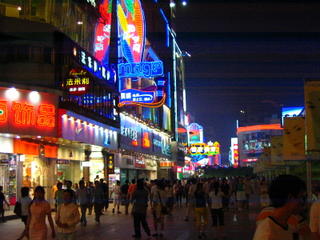
Whenever I tell people I grew up in Chengdu, the capital of Sichuan province, invariably they would comment, "Ah, that's a good place. Good food. Relaxed people. Truly Tian Fu Zhi Guo (heavenly country)." And if I let them know I haven't been back there for 7 years, those who have visited recently would turn dramatic: "Really? Oh it has changed so much. You wouldn't recognize it when you go back."
Sometimes, the dramatic is not nearly dramatic enough. The fact is, I don't recognize a TRACE of Chengdu since I came back three days ago. Glitzy highrises now dominate the Chengdu skyline. The fancy apartment building my parents moved into 8 years ago, is now the shabbiest in the neighborhood. On my last visit 7 years before, there were still old tile-roofed traditional houses in little alleys. Now they are all gone and the alleys have been widened and paved into avenues. The sight of cranes and constructions rivals those in Beijing and Shanghai. And the big shady phoenix trees have been replaced by dormant neon signs waiting for the night to come to life.
It is as if I was in a dream and some voice insisted, "This is Chengdu!", and I kept on shaking my head in disbelief.
The Chengdu municipal government, proud of its urban development efforts, had invited Long Yingtai, a famous Taiwanese writer to visit the city. Expecting some roaring praise, they got some harsh criticism instead. The ancient city had completely lost its charm in its bid to keep up with Beijing and Shanghai.
In the taxicab, I asked the driver if he knew of any old neighborhood still existing. He mentioned some place the name of which I no longer recognized. The government is preserving it for tourism purposes, he said.
My mom shouted from the back seat, "Why do you want to go there? So backwards." My parents have just moved back to Chengdu after living in Shanghai with my sister for two years. Their apartment got robbed. The robbers got in past a security guard and through the front door. The apartment complex they live in have iron fences now covering the balconies of the first four or five floors. They had missed Chengdu when they were in Shanghai. Now they want to move back to Shanghai.
The driver concurred, "Those old buildings should have been knocked down a long time ago. Who wants to live there? So crowded, and dark."
I don't want to live there either. I remember the days when the whole family of 4, or even 6 or 8, had to squeeze in a one-bedroom apartment, when the neighbors would fight over using the stove in the communal kitchen, when the aunties in the same work unit would gossip about every behavior of yours. I don't want to go back.
But memories would dissipate if bricks and walls that used to harbor them disappear. However, the question often is, for whom we are preserving the past?
"Look, there's some old building." The driver called out to my attention.
To our left, crushed between two constructions sites, limped a traditional house with its inside gutted. The white wall and the gray roof tiles looked anemic. There was a big Chinese character "Chai" (demolition) written on it.
The driver chuckled, "It's still there because they have forgotten to knock it down."
We drove by a road construction. There was a gaping trench along the street. Workers were digging.
"This place will be very pretty once the work is done." My dad commented, satisfied.


No comments:
Post a Comment